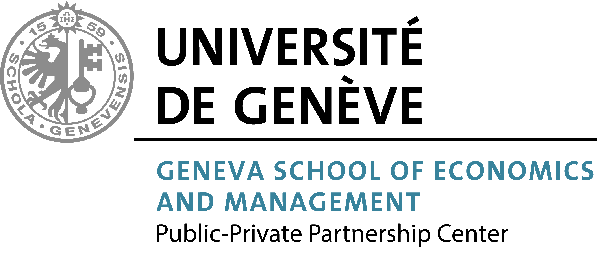The PPP Research Center team comes from a variety of disciplinary backgrounds, including business, management, international relations and global governance perspectives. We hold expertise in methodologies as diverse as systems approaches, narrative and network analysis, and longitudinal studies. In addition, we initiate further inter-disciplinary research and teaching projects within and outside the University.
Research themes
Effectiveness of Partnerships for Sustainable Development
We are collaborating with international and inter-disciplinary partners on this project, which is funded by the Swiss Network of International Studies (SNIS). Partnerships between public and non-state actors for the provision of collective goods have become important instruments for addressing core issues on the sustainable development agenda such as health, education, humanitarian issues, or clean energy. The UN Sustainable Development Goals (SDGs) emphasize the role of partnerships in the implementation of sustainability. Yet, while the academic literature provides valuable insights on the rise of public-private partnerships (PPPs), we know considerably less about their variable effectiveness and impact. Do PPPs simply repackage existing practices with effect and accountability, or do they contribute new and additional instruments and development outcomes? More information here.
Partnership governance boards
Do partnerships open up participation in governance to new actors, or conversely lock in the preferences of traditionally privileged actors? We argue that this zero-sum misconceptualisation of multi-stakeholderism is an artefact of field theory’s focus on ‘winning the field’. Moving beyond conventional field theory, we theorise multistakeholder partnerships as ‘spaces between fields’ (Eyal, 2013a), which are co-constructed by relations between heterogeneous stakeholders. Using network analysis, we map the relationships between the members of ten global financial partnership boards, bringing this blurry, emergent space into focus by revealing the relational topography that structures this multi-stakeholder space. (Paper under review; available one request from moira.faul@unige.ch).
The micro-level dimensions of managing PPPs
In contrast to rational accounts of partnering, this strand of research reveals the importance of the emotional commitment of partners to each other, the partnership, and the partnership's goals, and the ways in which feelings of appreciation and betrayal affect the achievement of partnership goals. (See paper titles here; available on request from ozgu.karakulak@unige.ch).
Another micro-level dimension we see particularly relevant for management of PPPs is the time. As partners in the PPPs have different institutional logics, which impose different, and mostly conflicting temporal orientations, structures and patterns. While working together, partners have to find a way to balance these conflicting temporal aspects. In our research we reveal the different types of temporal work which provides solutions to temporal tensions. (See paper titles here; available on request from ozgu.karakulak@unige.ch)
Coherent and strong organizational identity is an important asset for organizations, it has several functions such as guiding strategic decisions, bonding employees, filtering external demands etc. In this research, we question the role of organizational identity at an institutionally complex setting: institutionalized PPPs. How could PPP as a form of hybrid organization create organizational identity? What are the micro-processes involved? and How could PPPs use their identity as an asset to respond to external conditions? (See paper titles here; available on request from ozgu.karakulak@unige.ch)
Research activities
Our research activities focus on investigating partnership structures and strategies, as well as developing partnership evaluations and applying systems approaches to PPPs.
1. Partnering strategies
- Collaborating
- Coopetition
- Managing boundaries
- Sharing responsibilities
2. Partnership structures
- Configurations
- Design
- Power
- Relationships
3. Systems approaches
Partnerships are essentially a complex intervention in development: the more complex the intervention, the more systems thinking is needed to enable a comprehensive analysis and assessment of a partnership’s system-wide processes and effects. Despite recent enthusiasm for systems thinking in sustainable development, few existing studies explore the relationships and interconnectedness among diverse PPP system elements or other characteristics of complex systems such as non-linearity of effects or time. Our focus on systems builds on existing expertise to embark on an exciting new way of researching and evaluating PPPs.
4. Evaluating partnerships
“What are PPPs accountable for, and to whom?” This is the research question motivating our new line of enquiry. We will combine existing research that extends conventional PPP evaluation (Stadtler, 2015) with a systems approach to offer an innovative and attractive toolkit for evaluating the systemic properties and impacts of PPPs.
